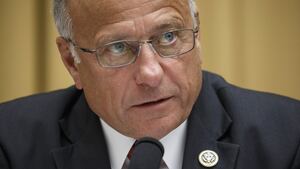Steve King may be a pariah among his fellow congressional Republicans. But he also may prove to be the conservative mastermind who prodded the GOP to kill Roe v. Wade.
While earlier this year the nine-term Iowa congressman’s Grand Ole Party stripped him of his committee assignments for, basically, palling around with neo-Nazis, he continues to remain relevant. That’s because, years ago, King laid the groundwork for an anti-abortion campaign that’s now manifesting itself in restrictive abortion laws being passed by conservative legislatures around the nation and threatening to ultimately kill Roe. And he did so over the protests of senior elected and unelected Republican leaders.
“That’s what I wanted to do,” King told The Daily Beast. “I wanted to lead this thing by about a year and a half, so we’d be ready before the court when now Justice [Brett] Kavanaugh was seated.”
In 2017, King authored the Heartbeat Protection Act, which effectively banned abortions around six weeks, once a fetal heartbeat is detected. The legislation was cheered by ardent anti-abortion activists. But it proved to be too controversial for then-House Speaker Paul Ryan, who declined to bring it up for a vote.
Ryan’s recalcitrance drew King’s ire. In the last Congress, he got on the House floor and unleashed on the Wisconsin Republican, as well as fellow former speaker John Boehner and National Right to Life for blocking the legislation. Those parties deny the accusation—which is that there was a pact among GOP leaders not to move any anti-abortion bills that failed to garner the support of the big three anti-abortion organizations: the Family Research Council, Susan B. Anthony, and National Right to Life. But King still accused the latter group of convincing Ryan never to bring his measure up for a vote.
“That is a frustration to me, but it also served, I think, an important purpose,” King said. “When it reached a plateau here in the House then I decided, we’ve got to put something on the scoreboard.”
So, King says, he began looking for ways to move the process forward outside Congress. And though he remains in a political diaspora on the Hill, the central tenet of his legislation is now en vogue for conservatives across the nation.
Five states have enacted laws similar to King’s so-called heartbeat bill, including Georgia, Kentucky, Mississippi, Ohio, and Alabama. And just Wednesday the Louisiana legislature joined the throng by passing its own so-called heartbeat bill, which the state’s Democratic governor, John Bel Edwards, signed shortly thereafter.
In addition to those states, more than 15 others have passed laws that fall at or below Roe standard for the viability of a fetus, which is around 23 or 24 weeks. Some, like Iowa’s law, have been struck down in court, but King says he believes the moment is coming where one of the bills will usher in a change in national law. And the congressman wants credit for it.
King insists that he personally played a consequential role in helping usher in Iowa’s so-called heartbeat measure that was signed into law last year. The congressman teamed up with state Sen. Jason Schultz—who represents King in the statehouse—who was on the three-member subcommittee that had to OK the bill before it made its way to the full chamber and eventually was signed into law by Gov. Kim Reynolds.
“I wrote the bill, sent it to them,” King recounted. “We kicked it back and forth a few times.”
Schultz slightly disputes King’s recounting of events—claiming a similar effort was already underway before King gave up on Speaker Ryan. But that doesn’t mean King and Schultz are on different pages when it comes to their attempts to overturn Roe.
“I would call it equal to the ending of slavery, and this one didn’t take a hot civil war,” Schultz told The Daily Beast.
For King, Iowa’s bill was a personal triumph. And, just as significantly, he surmises that it has served as an impetus for conservatives in other states to act.
“The Iowa passage of the bill seemed to say: A purple state like Iowa, if they can do it there, the rest of these states—it opened it up, and away we go,” King said of the legislation that has become the template for many of these sweeping anti-abortion laws passing nationwide.
The path to this point was not a straight line. Back in 2013, bills that are similar to King’s were enacted in Arkansas and North Dakota but were ultimately ruled unconstitutional by lower courts.
Things changed in 2016 with the election of Donald Trump. That’s when King said he redoubled his efforts, sensing the makeup of the Supreme Court would soon be more conservative, just as it is today. King said he’s undeterred by those prior lower court rulings, confident that the judicial landscape is changing.
“Of course they do, because a lower court is not going to overturn Roe v. Wade or Doe v. Bolton—it has to go to the Supreme Court before there’s going to be an affirmative ruling,” King said. “We always knew that from the beginning.”
Not everyone has been enthralled with King’s approach. And it’s not only because the congressman remains a toxic figure. Just in the last Congress, Speaker Ryan and National Right to Life feared that restrictive laws like the one King evangelizes for could backfire on their cause. Early abortion bans could be “a powerful weapon in the hands of pro-abortion lawyers that would jeopardize all current laws on abortion,” James Bopp, former chief counsel for the National Right to Life Committee, once wrote.
But the GOP establishment in D.C. has been outpaced by their army of advocates in state houses nationwide. The slew of controversial anti-abortion laws that have blossomed across the country are similar to King’s so-called heartbeat bill. Some laws even go further, like in Alabama, where abortions will be banned even in cases of even rape and incest. And fewer elected officials are comfortable embracing harsh penalties for those involved in administering abortions—such as jailing doctors.
“How else are you going to prohibit?” King said of such a punishment. “You can’t say, ‘Mother, may I?’ or ‘Please,’ so there has to be a penalty. And I think the penalty is legitimate.”
King’s willingness to embrace more extreme positions than his GOP colleagues is what has made him a political third rail in recent years. But on the abortion debate, the congressman insists he’s taken a more pragmatic path. King believes that life begins at conception even as he’s backed measures to ban abortion when a heartbeat is detected.
“That’s really when life begins, but a heartbeat is the most certain indicator of life,” King explained. “We can say all the things we want to say as a matter of reason, but when things resonate in our hearts, we also think with our emotions and the heartbeat bill speaks to the emotions of the people in this country.”
King’s calculation may, in the end, prove savvy. Some of his fellow anti-abortion Republicans have come out against the Alabama bill—which bans nearly all abortions at every stage of the pregnancy—on grounds that it was too extreme. They could end up embracing a six-week ban on the assumption that it’s a compromise.
“I don’t agree with the Alabama law. I mean, I think it’s very very restrictive,” Sen. Shelley Moore Capito (R-WV) told The Daily Beast.
While many Republicans are rushing to embrace anti-abortion legislation at the state level, Democrats are up in arms—trying to drum up public support to make their voices heard.
“I’m not afraid, I’m not worried. Women are not going to go back,” Rep. Jan Schakowsky (D-IL) told The Daily Beast. “I don’t know exactly how that’s going to look, but I’m telling you, women are not going to tolerate the inability to make decisions about their own body, to have control of their families: to have an abortion. No. It’s not going to happen.”







